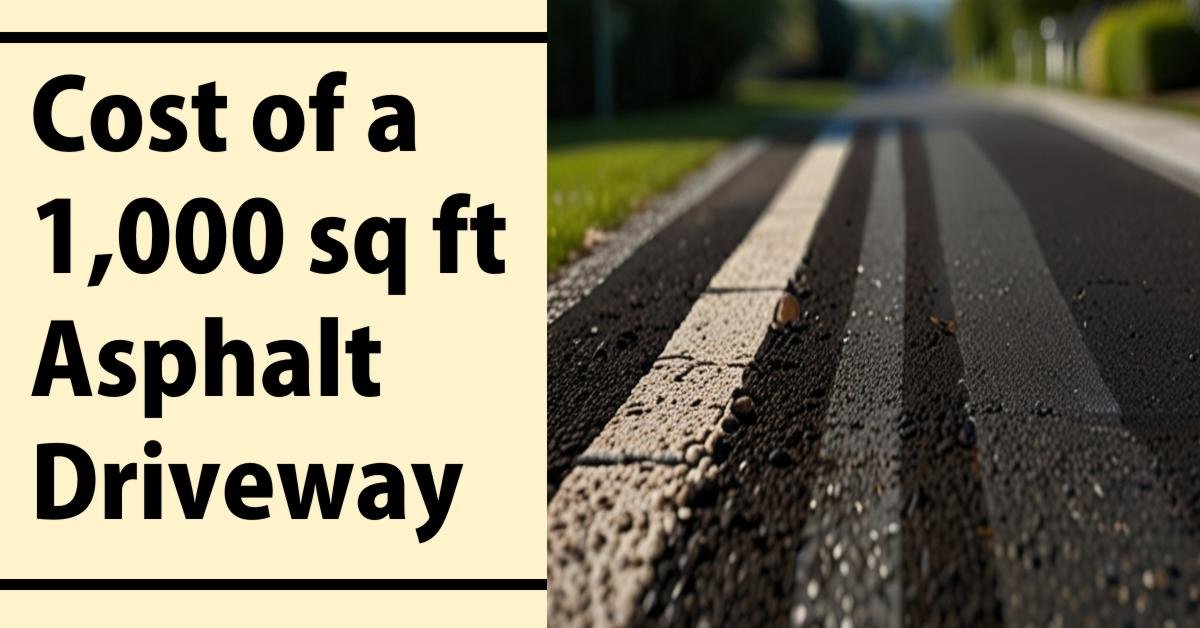Asphalt driveways are popular for homeowners due to their durability, cost-effectiveness, and aesthetic appeal. However, determining the exact cost of an asphalt driveway can be challenging due to various factors influencing the final price. This article will break down these factors and provide a step-by-step guide to help you calculate the cost of your asphalt driveway project.
Steve Axton wrote this article with 25 years of experience in Cost Estimation and Asphalt Calculations. Facts are checked by Omar Chavez, Chief, Infrastructure Assessment Branch.
Factors Affecting the Cost of an Asphalt Driveway
The cost of an asphalt driveway is influenced by several key factors, including materials, labor, and additional expenses. Let’s explore each of these in detail: Materials Costs The primary material cost in an asphalt driveway project is, of course, the asphalt itself. However, it’s important to understand that there are different types of asphalt available, each with its own price point and characteristics. Types of asphalt:
Hot Mix Asphalt (HMA):
This is the most common type used for driveways. It’s durable and provides a smooth finish. Warm Mix Asphalt (WMA): A more environmentally friendly option that requires less energy to produce and install. Cold Mix Asphalt: Used primarily for repairs and not typically for entire driveways.
The cost per square foot of asphalt can vary significantly based on factors such as:
Quality of the mix Current oil prices (as asphalt is a petroleum product) Local availability and transportation costs
On average, you can expect to pay between $2 to $5 per square foot for the asphalt material alone. However, this price can fluctuate based on market conditions and your location. Labor Costs Labor costs make up a significant portion of the total expense for an asphalt driveway installation. These costs can vary based on several factors:
The number of workers required and the time needed to complete the project will influence the total labor cost. Highly sought-after contractors may charge premium rates for their services.
Additional Costs Several additional factors can impact the overall cost of your asphalt driveway:
Depending on your location, you may need to obtain permits for your driveway project. The cost of these permits can vary widely based on local regulations. Preparation and excavation: Before laying the asphalt, the area needs to be properly prepared. This may involve:
Removing existing surfaces Excavating to create a proper base Grading the area for proper drainage
Proper drainage is crucial for the longevity of your asphalt driveway. Additional costs may be incurred for:
Installing drainage systems Creating slopes for water runoff Addressing any existing drainage issues
Sealcoating and finishing touches: After installation, your driveway may require:
Sealcoating to protect the surface (typically done 6-12 months after installation) Striping or other decorative elements Edging or landscaping around the driveway
These additional costs can add anywhere from $1 to $3 per square foot to your project.
Step-by-Step Cost Calculation
Now that we’ve covered the factors affecting the cost, let’s break down the process of calculating the cost of your asphalt driveway: Step 1: Measure the Area Accurate measurement is crucial for estimating costs. To measure your driveway area:
Measure the length and width of your driveway in feet. For irregularly shaped driveways, break the area into rectangles and triangles, measure each separately, and add them together. Multiply the length by the width to get the square footage.
Pro tip: Add about 10% to your measurements to account for waste and ensure you have enough material. Step 2: Estimate Material Costs To calculate the amount of asphalt needed:
Take your total square footage and divide it by 100 to determine the number of tons required. (One ton of asphalt typically covers about 100 square feet at a 2-inch depth.) Multiply the number of tons by the current price per ton of asphalt in your area.
Example breakdown:
1,000 sq ft driveway ÷ 100 = 10 tons of asphalt needed If asphalt costs $100 per ton: 10 tons × $100 = $1,000 for materials
Estimate Labor Costs To estimate labor costs:
Contact local contractors for quotes. Aim to get at least three estimates. Ask for a breakdown of labor costs per square foot or as a total for the project.
Tips for finding and hiring a reputable contractor:
Check online reviews and ratings Ask for references from past clients Verify licenses and insurance Get detailed, written estimates
Let’s walk through a detailed example calculation for a 1,000 sq ft asphalt driveway:
Material Costs:
1,000 sq ft ÷ 100 = 10 tons of asphalt needed Asphalt cost: $100 per ton Total material cost: 10 × $100 = $1,000
Labor Costs:
Average labor rate: $6 per square foot Total labor cost: 1,000 sq ft × $6 = $6,000
Additional Expenses:
Permits: $200
Site preparation and grading: $1,000
Drainage improvements: $500
Future seal coating: $400
Total Cost Breakdown:
Materials: $1,000 Labor: $6,000 Additional expenses: $2,100 Total estimated cost: $9,100
This example demonstrates that for a 1,000 sq ft asphalt driveway, you might expect to pay around $9,100, or approximately $9.10 per square foot. However, remember that this is just an example, and actual costs can vary significantly based on your specific circumstances and location.
Here is the detailed Microsoft Excel Sheet for the Cost Calculation of an Asphalt Driveway.
Download Excel Workbook

Asphalt Driveway Cost Calculator
